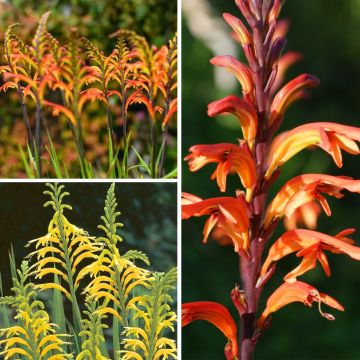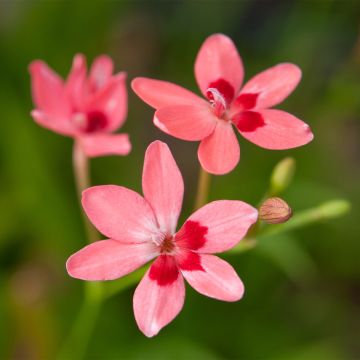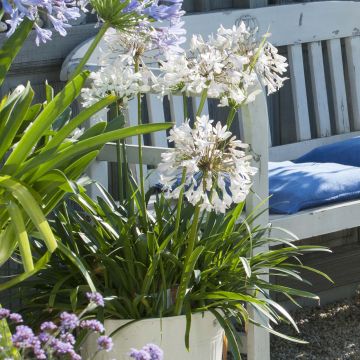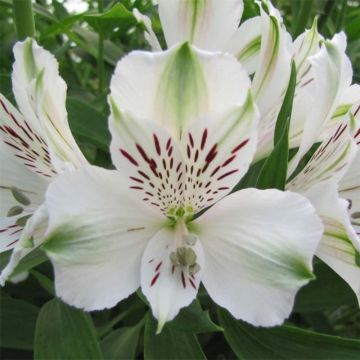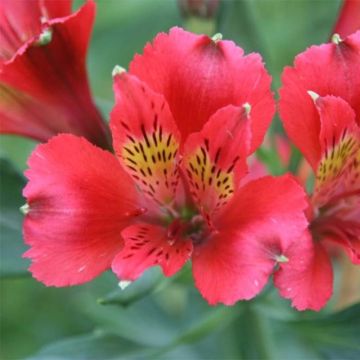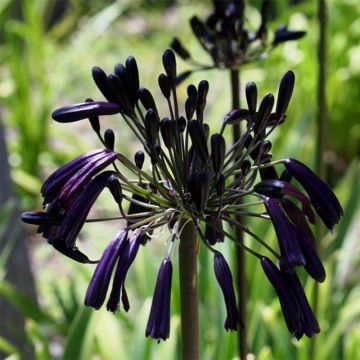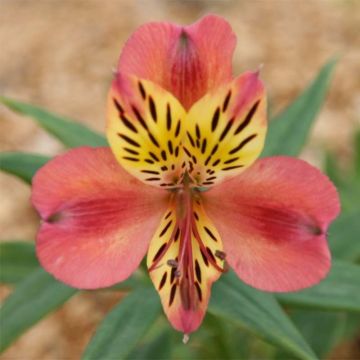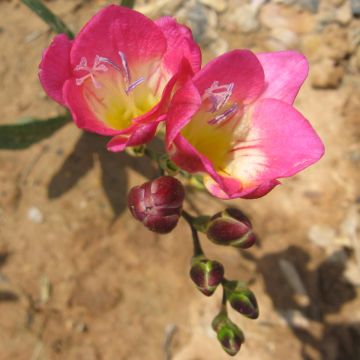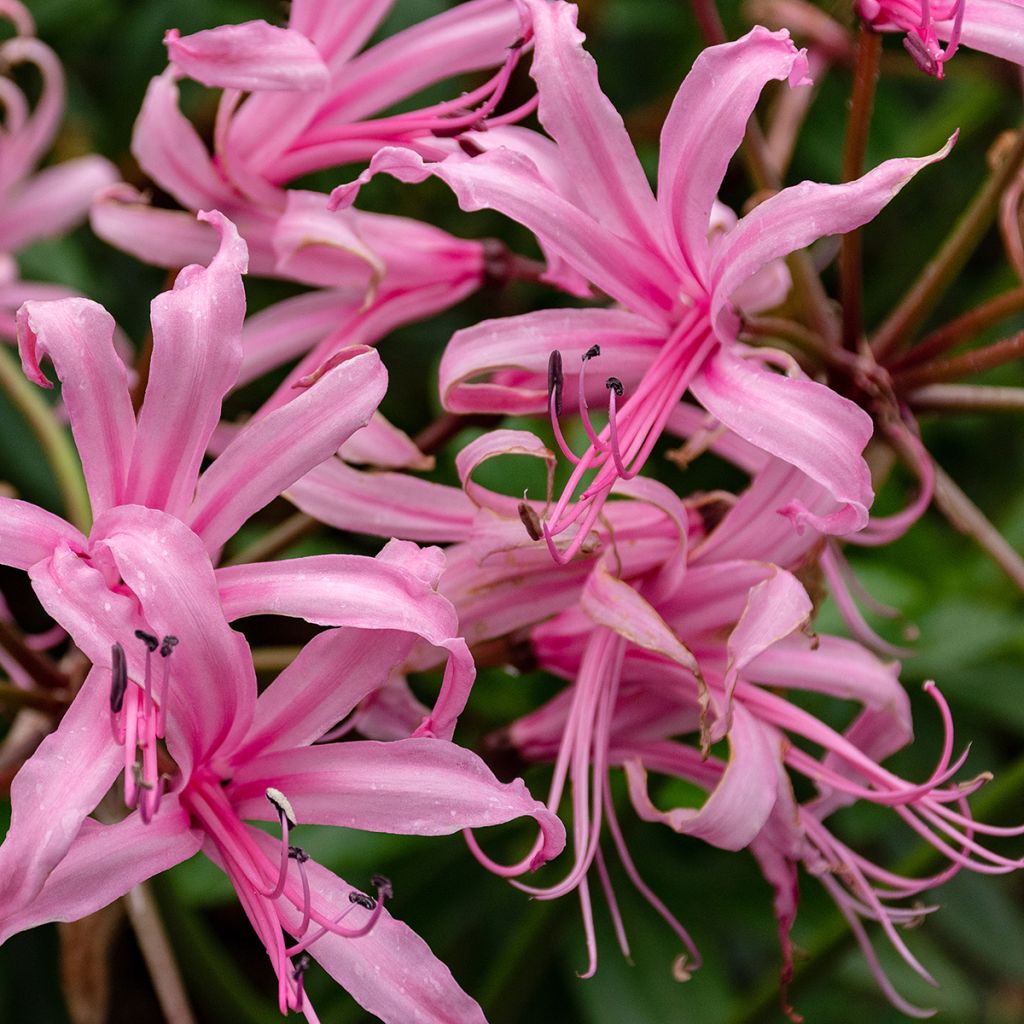

Nerine bowdenii
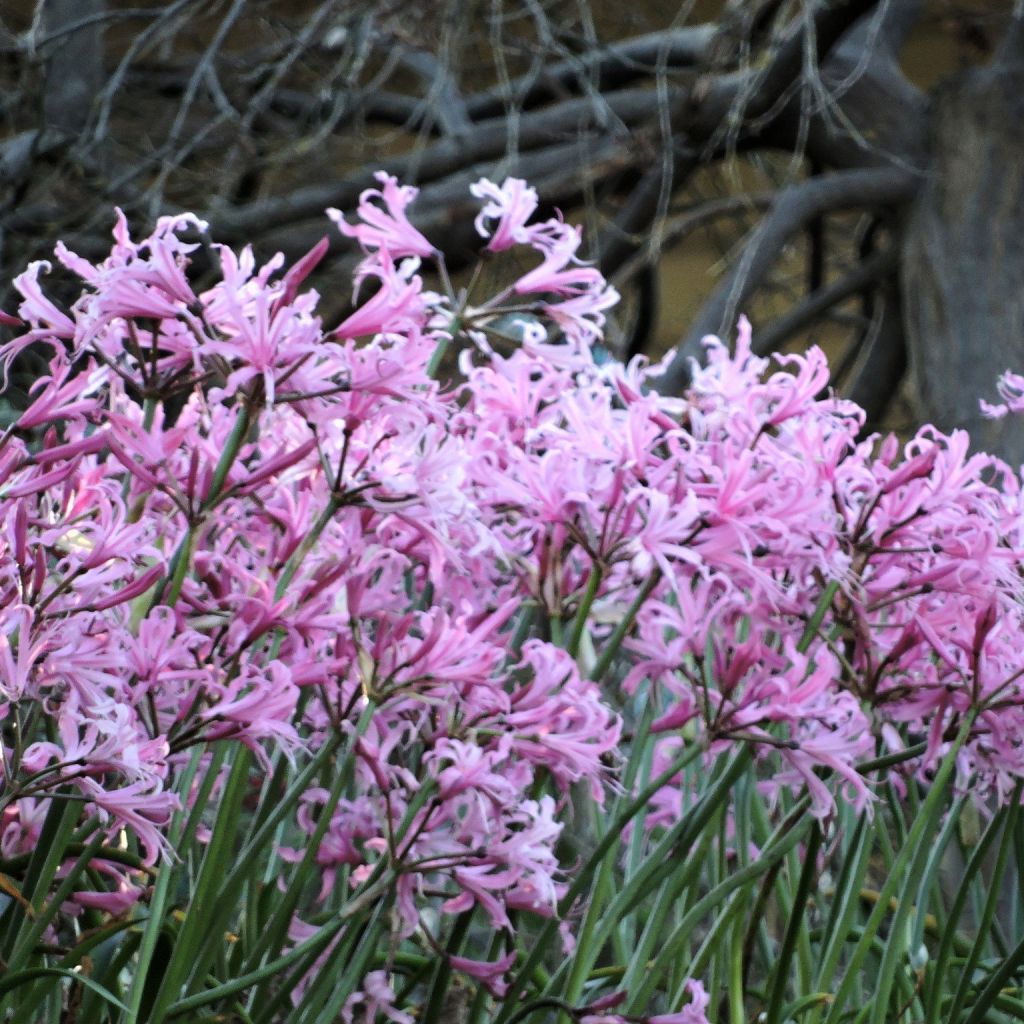

Nerine bowdenii
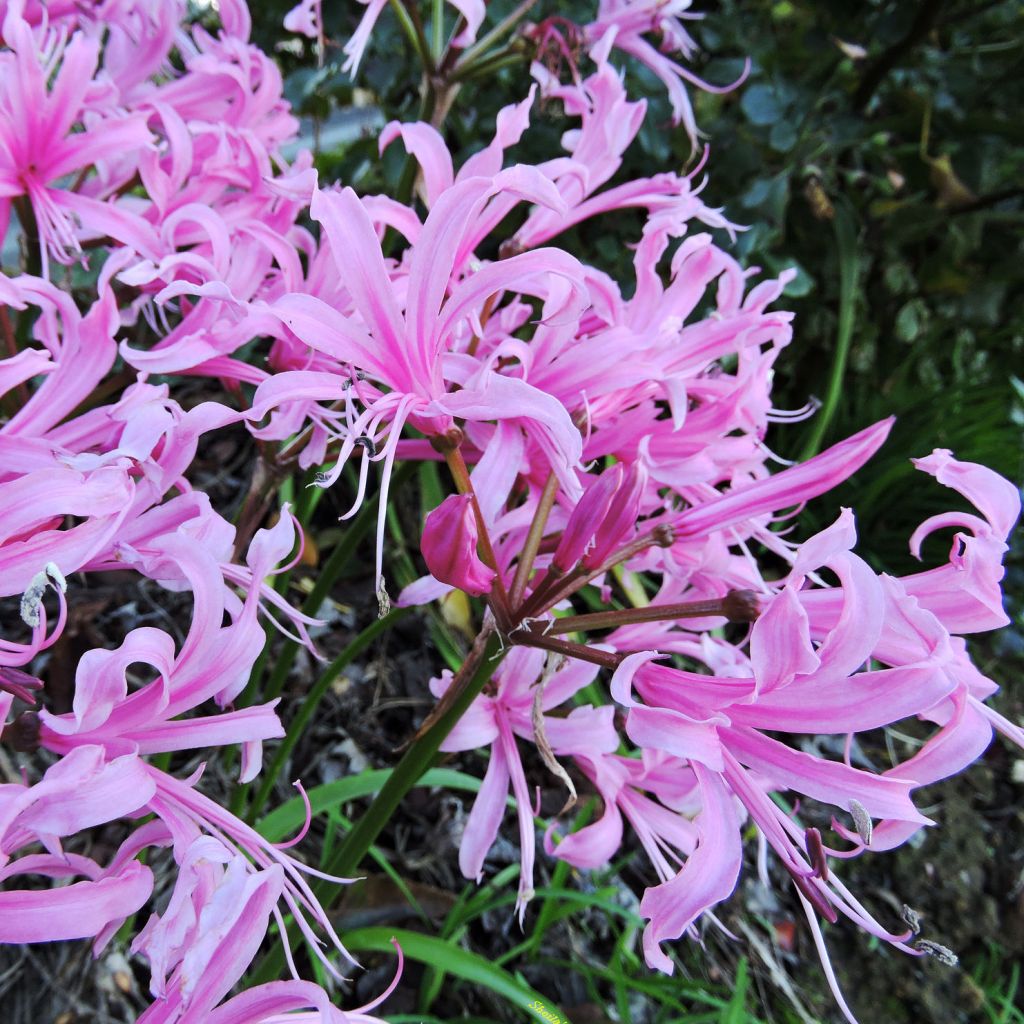

Nerine bowdenii
Nerine bowdenii
Nerine bowdenii
Bowden Lily, Cape Flower, Guernsey Lily
Out of three nerines, only two have come up, and they are currently in flower.
joelle, 13/10/2025
Special offer!
Receive a €20 voucher for any order over €90 (excluding delivery costs, credit notes, and plastic-free options)!
1- Add your favorite plants to your cart.
2- Once you have reached €90, confirm your order (you can even choose the delivery date!).
3- As soon as your order is shipped, you will receive an email containing your voucher code, valid for 3 months (90 days).
Your voucher is unique and can only be used once, for any order with a minimum value of €20, excluding delivery costs.
Can be combined with other current offers, non-divisible and non-refundable.
Home or relay delivery (depending on size and destination)
Schedule delivery date,
and select date in basket
This plant carries a 6 months recovery warranty
More information
We guarantee the quality of our plants for a full growing cycle, and will replace at our expense any plant that fails to recover under normal climatic and planting conditions.
Would this plant suit my garden?
Set up your Plantfit profile →
Description
Nerine bowdenii, also known as Guernsey Lily or Jersey Lily, just like agapanthus, is native to South Africa. Its late flowering, in September-October in our climates, is absolutely magnificent. Its lightly scented flowers, with thin undulating petals, in a fresh and translucent pink, are gathered in umbels at the top of cylindrical stems while the foliage is still dormant. The foliage reappears after flowering, in the form of ribbon-like leaves arranged in small tufts that persist in winter. Well adapted to the Mediterranean climate, it is preferable to grow this lovely bulbous plant in pots that you will shelter in northern winters.
The Bowden's Nerine, named "Flower of the Cape" due to its origins, would have, according to legend, been brought to the Channel Islands during a maritime transport and would have stranded there, following the shipwreck of a Dutch ship carrying its bulbs. This herbaceous plant has a large bulb (3 to 5cm (1 to 2in) in diameter), protected by a tunic and extended by a neck, and equipped with a few fleshy roots. It multiplies vegetatively by producing bulblets on the periphery of the mother bulb. In late summer, for 2 to 3 weeks, the plant produces flower stalks about 50cm (20in) tall, carrying 7 to 15 wide lily flowers, with narrow petals, undulated at the edges, in a sparkling pink, marked with a deeper pink midline. The flower's centre has long bright pink stamens. As soon as the flowering ends, ribbon-like leaves appear, about 20cm (8in) long and 1cm (0in) wide, arranged in two opposite rows. The leaves die at the end of spring and the bulb goes dormant until the end of summer. During this summer dormancy period, the bulb must be protected from excessive humidity. Nerine bulbs do not flower every year. Therefore, it is advisable to plant them in groups of 12 to ensure flowers every year.
Nerines make excellent cut flowers, with excellent vase life. In southern or coastal regions, they will accompany agapanthus and Amaryllis belladonna in well-drained soil beds in a hot and sunny exposure. All these plants can be used as a focal point on a terrace, in an exotic or contemporary style. Elsewhere, plant it in a large pot, on a sunny terrace in summer and store it for winter.
Important to know: Nerines are sensitive to polluted urban environments.
Bulb size: 12+
Report an error about the product description
Nerine bowdenii in pictures
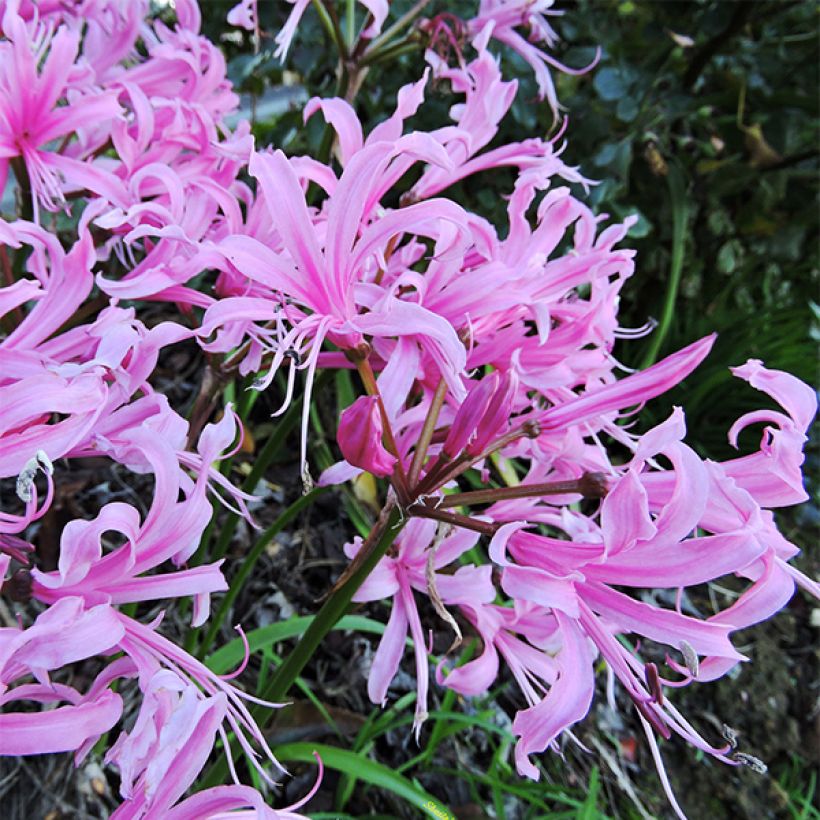

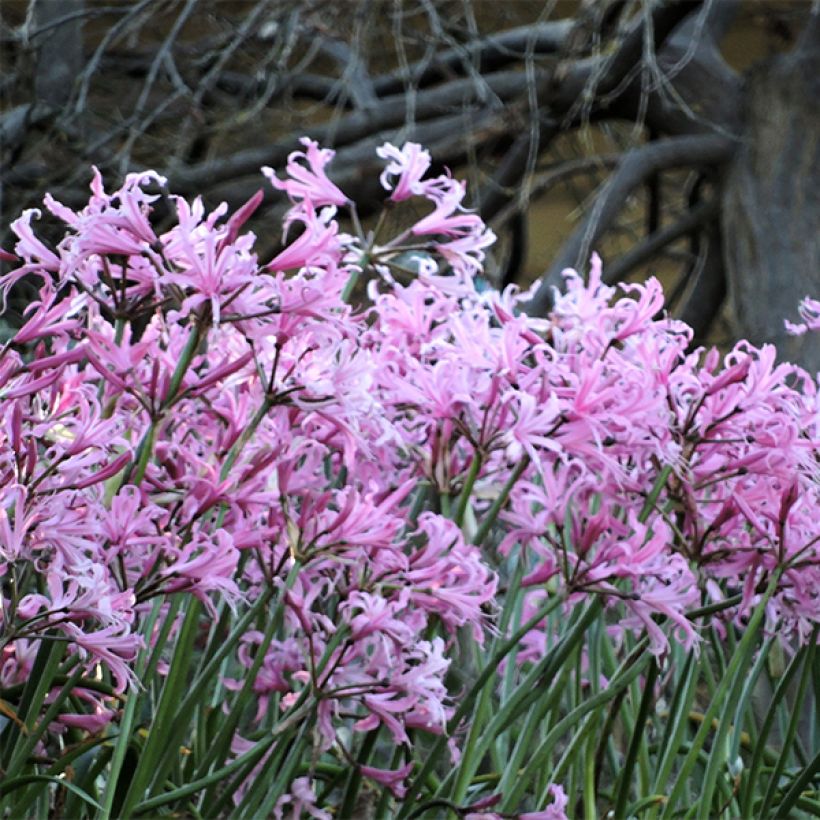

Plant habit
Flowering
Foliage
Botanical data
Nerine
bowdenii
Amaryllidaceae (Liliaceae)
Bowden Lily, Cape Flower, Guernsey Lily
South Africa
Planting and care
Planted at a depth of 10cm (4in), even near the surface of the soil in mild climates, spaced 8cm (3in) apart, in full sun, the bulbs are hardy up to -12°C (10.4°F) in very well-drained soil. They need a summer dormancy period, in dry soil and in the sun, so that the bulbs 'cook'. The soil that accommodates them should be light, deep, fertile, and perfectly drained. If water is lacking during the flowering period, the plant will go dormant again. It will wait for the return of rain to produce a flowering that will then be later and much less spectacular. In northern regions, it is preferable to cultivate them in pots that you will shelter in winter. Plant in groups of 12, to be sure to have flowers every year. Indeed, a nerine bulb does not necessarily flower every year.
Planting period
Intended location
Care
-
, onOrder confirmed
Reply from on Promesse de fleurs
Similar products
Haven't found what you were looking for?
Hardiness is the lowest winter temperature a plant can endure without suffering serious damage or even dying. However, hardiness is affected by location (a sheltered area, such as a patio), protection (winter cover) and soil type (hardiness is improved by well-drained soil).

Photo Sharing Terms & Conditions
In order to encourage gardeners to interact and share their experiences, Promesse de fleurs offers various media enabling content to be uploaded onto its Site - in particular via the ‘Photo sharing’ module.
The User agrees to refrain from:
- Posting any content that is illegal, prejudicial, insulting, racist, inciteful to hatred, revisionist, contrary to public decency, that infringes on privacy or on the privacy rights of third parties, in particular the publicity rights of persons and goods, intellectual property rights, or the right to privacy.
- Submitting content on behalf of a third party;
- Impersonate the identity of a third party and/or publish any personal information about a third party;
In general, the User undertakes to refrain from any unethical behaviour.
All Content (in particular text, comments, files, images, photos, videos, creative works, etc.), which may be subject to property or intellectual property rights, image or other private rights, shall remain the property of the User, subject to the limited rights granted by the terms of the licence granted by Promesse de fleurs as stated below. Users are at liberty to publish or not to publish such Content on the Site, notably via the ‘Photo Sharing’ facility, and accept that this Content shall be made public and freely accessible, notably on the Internet.
Users further acknowledge, undertake to have ,and guarantee that they hold all necessary rights and permissions to publish such material on the Site, in particular with regard to the legislation in force pertaining to any privacy, property, intellectual property, image, or contractual rights, or rights of any other nature. By publishing such Content on the Site, Users acknowledge accepting full liability as publishers of the Content within the meaning of the law, and grant Promesse de fleurs, free of charge, an inclusive, worldwide licence for the said Content for the entire duration of its publication, including all reproduction, representation, up/downloading, displaying, performing, transmission, and storage rights.
Users also grant permission for their name to be linked to the Content and accept that this link may not always be made available.
By engaging in posting material, Users consent to their Content becoming automatically accessible on the Internet, in particular on other sites and/or blogs and/or web pages of the Promesse de fleurs site, including in particular social pages and the Promesse de fleurs catalogue.
Users may secure the removal of entrusted content free of charge by issuing a simple request via our contact form.
The flowering period indicated on our website applies to countries and regions located in USDA zone 8 (France, the United Kingdom, Ireland, the Netherlands, etc.)
It will vary according to where you live:
- In zones 9 to 10 (Italy, Spain, Greece, etc.), flowering will occur about 2 to 4 weeks earlier.
- In zones 6 to 7 (Germany, Poland, Slovenia, and lower mountainous regions), flowering will be delayed by 2 to 3 weeks.
- In zone 5 (Central Europe, Scandinavia), blooming will be delayed by 3 to 5 weeks.
In temperate climates, pruning of spring-flowering shrubs (forsythia, spireas, etc.) should be done just after flowering.
Pruning of summer-flowering shrubs (Indian Lilac, Perovskia, etc.) can be done in winter or spring.
In cold regions as well as with frost-sensitive plants, avoid pruning too early when severe frosts may still occur.
The planting period indicated on our website applies to countries and regions located in USDA zone 8 (France, United Kingdom, Ireland, Netherlands).
It will vary according to where you live:
- In Mediterranean zones (Marseille, Madrid, Milan, etc.), autumn and winter are the best planting periods.
- In continental zones (Strasbourg, Munich, Vienna, etc.), delay planting by 2 to 3 weeks in spring and bring it forward by 2 to 4 weeks in autumn.
- In mountainous regions (the Alps, Pyrenees, Carpathians, etc.), it is best to plant in late spring (May-June) or late summer (August-September).
The harvesting period indicated on our website applies to countries and regions in USDA zone 8 (France, England, Ireland, the Netherlands).
In colder areas (Scandinavia, Poland, Austria...) fruit and vegetable harvests are likely to be delayed by 3-4 weeks.
In warmer areas (Italy, Spain, Greece, etc.), harvesting will probably take place earlier, depending on weather conditions.
The sowing periods indicated on our website apply to countries and regions within USDA Zone 8 (France, UK, Ireland, Netherlands).
In colder areas (Scandinavia, Poland, Austria...), delay any outdoor sowing by 3-4 weeks, or sow under glass.
In warmer climes (Italy, Spain, Greece, etc.), bring outdoor sowing forward by a few weeks.






























